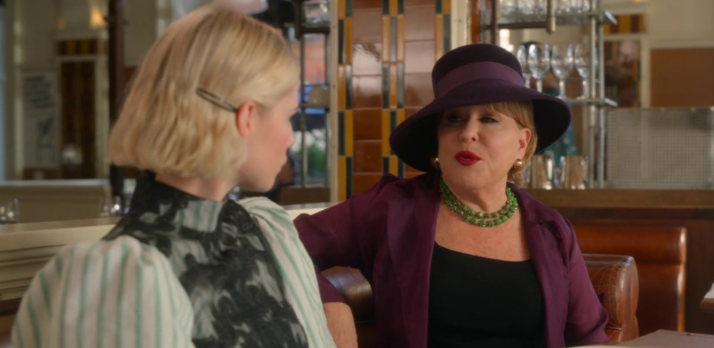Logansport Pharos-Tribune
The Divine, Demure Miss MÂ Is On A Roll With ‘For The Boys‘
By Ryan Murphy
November 28,1991Â Â
“For me, there are no challenges as far as acting is concerned,” says Bette Midler, completely serious. “I just get up in the morning and do it. I never wake up and say, ‘Oh my God, this is so hard!’ Oh no no no, that’s not me. At this point in my l i f e, I feel I can do ANYTHING.”
That said, Midler guffaws, grabs the interviewer’s lapels, widens her raisin orbs into Gloria  Swanson-size bull’s-eyes and acts the part of a psychotic legend gone to seed. “Don’t you agree?!” she hisses.
“Well, you’d better!”
Manic and merry in a Four Seasons hotel suite, where she is holding court, talking about her  l i fe  and times and new movie musical “For the Boys,” Midler is nothing like the tough old movie broad she self-cons c i o u s ly sends up. There ‘s not a rough edge in sight.
All curves and cashmere and billowy softness, she looks like a Botticelli subject on Slimfast. Toned after mo n t hs of tap lessons (she clicked away 20 pounds), yet still decidedly ripe and f u l l – f i g u r e d, she is larger than l i f e, even in repose. The famous bosom spills pr e c a r ious ly out of a jade green Armani suit. On her nose rests a pair of granny spectacles; on her head, a peroxided pineapple of a hairdo.
On this warm Los Angeles afternoon, however, her most noticeable accessory is her confidence. She is convinced that “For The Boys,” 20th Century-Fox‘s $40 mi l l ion holiday spectacular about the travails of two USO entertainers, is a winner.
In the film, Midler appears opposite “the f a b u l o u s” James Caan, who plays Eddie Sparks, a Bob Hope character who sings, dances and argues with Midler’s Dixie Leonard, a w a r t i me b o m b s h e ll who ages 50 years before our eyes and, like Midler, can do just about anything.
“This character is the most exciting I ‘ve ever played,” she rhapsodizes. “She sings, she dances, she chews the scenery, she makes people cry, makes them laugh.” Midler leans back and expels a heartfelt sigh of r e l i e f. “Fina l ly,” she says, ” I ‘ve f o u nd a film that truly takes advantage of all my abilities.”
At 46 she has, indeed, arrived. Ma r r i ed w i th c h i ld a nd b l i s s f u l ly busy at the office (her All Girl Productions is developing more than a dozen projects), she is at the peak of her powers. Her string of ’80s Disney comedies has made Walt’s studio richer to the tune of $300 million and has transformed her into a one-woman commodity; there is Oscar talk for her performance in “For The Boys.”
“We’ll see,” she says. “Who the hell knows? I mean, I think I should have been nominated for ‘Beaches.’ The critics didn’t like it, but the people sure adored it,”
Ten years ago, it was a different story. The p u b l ic and the critics turned away from 1982’s “Jinxed!,” the aptly named f o l l ow- up to her 1979 f i lm debut “The Rose,” and Midler was, essentially, washed up.
She drowned her sorrows in the bott l e,  t r e m b l ed  t o w a rd  a  n e r v o us breakdown and was sure she would never work again.
“But she sure turned it all around, didn’t she?” marvels Mark Rydell, a close friend who directed her in “The Rose” and in “For The Boys.” “Hollywood couldn’t figure out what to do with her at first. But now, she’s like this national monument. She should be up on Mount Rushmore.”
T e ll this to M i d l er a nd she shrieks. “Oh, right! What does that mean? That I’m craggy?!”
OK, so maybe monument is too strong a word. But Midler will take credit for filling a void.
“When I came on the scene in 1972,1 think people wanted a hearty, fuller, robust character  like myself, because it was in opposition to the skinny little things like Diana Ross that they had been confronted with for years.”
And is Dixie Leonard, like Midler’s theatrical persona, the Divine Miss M, a diva? She recoils at the thought. “Oh no, no, honey,” she says. “There’s no temperament involved with her. When you say diva, I think of outrageousness, and Dixie is not outrageous. She’s a real person. When I think diva, I think of people who are allowed to have fits, like Maria Callas. Now, she was a diva. Have you ever heard her sing? Oh, she was INSANE. She was just MAD!”
Midler leans forward in her seat and shakes a finger. “You know, I popul a r i z ed that word diva. But I think that term is misused now. Every other filly out of the gate is called a diva nowadays. And you know what? They ain’t divas to me!” She lets out a whoop, “And I do not like the competition! Not that I have any.”










